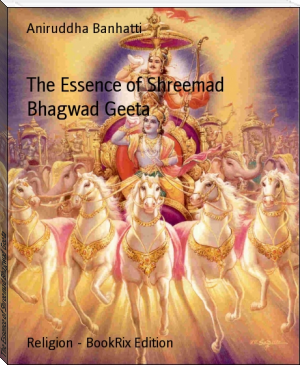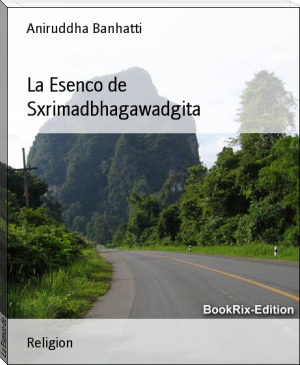The Essence of Shreemad Bhagwad Geeta by Aniruddha Banhatti (best sci fi novels of all time TXT) 📖

Download in Format:
- Author: Aniruddha Banhatti
Book online «The Essence of Shreemad Bhagwad Geeta by Aniruddha Banhatti (best sci fi novels of all time TXT) 📖». Author Aniruddha Banhatti
with utter devotion.
O Arjun, I have revealed to you this secret of the Supreme Being. Knowing this, a human being becomes knowledgeable and fulfilled”.
This part is known as ‘The Yoga of Supreme Being’ or ‘Purushottam Yoga’.
Part Sixteen
In this part, Lord Shrikrushna has expounded about divine wealth and demonical wealth. Here the word wealth is understood as attribute or nature of things.
Shrikrushna said, “While taking birth, the virtues and vices accompanying an individual comprise the divine and demonical wealth respectively.
Divine wealth means the virtues. Purity of mind, non-violence, truth, knowledge, pity, non-covetousness, brightness, mercy and many other virtues accompany the individual born in divine wealth. Demonical wealth means vices. Boastfulness, pretensions, false pride, anger, ignorance, cruelty and other vices accompany the individual born in demonic wealth. Divine wealth is superior and by it the human being attains freedom and Demonical wealth binds the human being in the shackles of deaths and rebirths.
OArjun, you are born with the divine wealth, hence you have no need for repentance. In the world, there are two types of humans; of divine nature and of demonical nature. Already I have told you about the virtues and vices accompanying such humans. Now listen to some more description of the demonical humans.
O Arjun, these people do intense, terrifying and cruel deeds. They are apparently born for destruction of the world. They believe that enjoying the various pleasures of the flesh or the senses is the sole aim of life. For that, they acquire wealth by any which way.
They deny the existence of God. Boastful, proud and drunk with money and power, they perform pieties pretentiously and only for namesake. These cruel people go to hell in the end.
Lust, anger and greed are the three doors leading to the hell. The person steering clear of these three doors, performs good deeds and attains liberation. But the one who disregards these teachings, and behaves irresponsibly gets neither pleasure nor power, nor liberation
Hence, O Arjun, for the decision of one’s duty or non-duty, you take the scriptures as standard and behave accordingly”
This part is known as ‘The Yoga of division of Divine and Demonical Wealth’ or ‘Daivasura Sampad Vibhaga Yoga’.
Part Seventeen
Arjun said, “Many people perform Yadna and other pieties with faith but without strict rituals. What kind of faith do they show? Whether Sattvik, Rajas or Tamas?”
Shrikrushna said,“O Arjun, faith is of three types. Sattvik i.e., balanced Rajas,i.e., desire based or Tamas i.e., ignorance based. Human being is made up of faith. All persons are exactly as per their faith. As the faith is of three types, people are also of three types.
People with Sattvik faith like juicy, nurturing and satiating food.
Those with the desire attribute like pungent, burning and dry food.
Those with ignorant attribute like non-juicy, old, impure and fermenting food.
Likewise, Yadna, that is the sacrifice of offerings in sacrificial or holy fire penance and charity are also of three types.
The Yadna done with a happy mind, without any ulterior motive and done according to procedure laid down in scriptures is the Sattvik Yadna.
The Yadna done pretentiously and with some ulterior motive is the Rajas Yadna.
The Yadna done disregarding the scriptures, without holy chanting without charity is the Tamas Yadna.
The penance is also of three types.
If done with steady mind, with faith and desiring nothing in return, it is the Sattvik penance.
Penance done pretentiously, with a wish to become famous due to it,
to win reverence of others, is the Rajas penance
Penance done with stupidity, done head strongly, and done desiring destruction of someone else is the Tamas penance.
Charity given without desiring fruits, given as a sense of duty, given to deserving persons is the Sattvik charity.
Charity given with a desire for its fruits, or with a desire of getting something in return, is the Rajas charity.
Charity given to undeserving person, given humiliatingly, is the Tamas charity."
Then after explaining the meaning of the words ‘Om Tat Sat’, Lord Shrikrushna said," O Arjun, the yadna, devotion, etc., done without faith is untruth and is useless in this world as well as the other worlds."
This part is called ‘The Yoga of Three Types of Faith’ or 'Shraddha Traya Yoga'.
Part Eighteen
This last part is the summing up of the entire Geeta.
Shrikrushna said, "O Arjun, not doing any of the do-able actions is called 'renunciation' or 'sanyas’. Giving up all the actions to the God and rejecting the fruits of one 's actions is called 'sacrifice' or ‘tyaga'. Everyday human being has to go on doing actions but not expecting the fruit of one's actions is the true nature of sacrifice. The one who sacrifices the fruits of one's actions thus is an altruist or Tyagi. The one who renounces all but the involuntary actions, is called Sanyasi. A Tyagi or a Sanyasi is not bound by the actions. One’s natural or professional actions even if superficially faulty, should not be abandoned. Thus to fight a just war is the duty of someone who is a warrior or a king by profession. Abandoning it due to it being violent and hence faulty is meaningless. If your blood relations are against you and support injustice, they verily are your enemies. Each and every human action is bound to have one fault or the other. But due to this, abstaining from action itself is ridiculous. Getting rid of self pride that I am the doer of this action, getting rid of ego, desire, keeping equality in all living beings, with a happy mind, one who offers devotion to me knows me in my true form and merges with me. Thence, O Arjun, you donate all your actions unto me and become one with me. Keep your heart and mind fixed in me thence you will survive all ordeals. Because of ego and due to ignorance, if you feel that you will not fight this battle, then your resolve is useless. Because of your natural deeds you are bound. Thence you will have to fight this battle surrendering to the nature. O Arjun, with all your being, you surrender unto me. I will absolve you of all your sins.
O Arjun, I love you very much. You are my favorite devotee. Therefore I have given you this very secret knowledge. O Arjun, reveal this knowledge to any deserving human beings and interested listeners. "
Lord Shrikrushna said again," O Arjun, did you listen to this carefully? The temptation of abandoning action formed by your ignorance is it destroyed now?"
Thence Arjun said, "O Shrikrushna, my ignorance is destroyed, thanks to you, all my doubts are gone now. I have become conscious about my duty. I will do now everything as you say."
Sanjay was telling all this to Dhrutarashtra. He said," O King Dhrutarashtra, listening to this divine dialogue between Krushna and Arjun, and remembering the unbelievable cosmic Meta form of Shrikrushna, I am rejoicing and wondering again and again. Verily, O King, wherever there are Lord Shrikrushna and Archer Arjun, there is always luck, wealth, victory, abundance, eternal pleasure and ethics. Thus is my definite opinion."
This part is known as ‘The Yoga of Renunciation and Liberation’ or ‘Moksha Sanyas Yoga’.
Imprint
O Arjun, I have revealed to you this secret of the Supreme Being. Knowing this, a human being becomes knowledgeable and fulfilled”.
This part is known as ‘The Yoga of Supreme Being’ or ‘Purushottam Yoga’.
Part Sixteen
In this part, Lord Shrikrushna has expounded about divine wealth and demonical wealth. Here the word wealth is understood as attribute or nature of things.
Shrikrushna said, “While taking birth, the virtues and vices accompanying an individual comprise the divine and demonical wealth respectively.
Divine wealth means the virtues. Purity of mind, non-violence, truth, knowledge, pity, non-covetousness, brightness, mercy and many other virtues accompany the individual born in divine wealth. Demonical wealth means vices. Boastfulness, pretensions, false pride, anger, ignorance, cruelty and other vices accompany the individual born in demonic wealth. Divine wealth is superior and by it the human being attains freedom and Demonical wealth binds the human being in the shackles of deaths and rebirths.
OArjun, you are born with the divine wealth, hence you have no need for repentance. In the world, there are two types of humans; of divine nature and of demonical nature. Already I have told you about the virtues and vices accompanying such humans. Now listen to some more description of the demonical humans.
O Arjun, these people do intense, terrifying and cruel deeds. They are apparently born for destruction of the world. They believe that enjoying the various pleasures of the flesh or the senses is the sole aim of life. For that, they acquire wealth by any which way.
They deny the existence of God. Boastful, proud and drunk with money and power, they perform pieties pretentiously and only for namesake. These cruel people go to hell in the end.
Lust, anger and greed are the three doors leading to the hell. The person steering clear of these three doors, performs good deeds and attains liberation. But the one who disregards these teachings, and behaves irresponsibly gets neither pleasure nor power, nor liberation
Hence, O Arjun, for the decision of one’s duty or non-duty, you take the scriptures as standard and behave accordingly”
This part is known as ‘The Yoga of division of Divine and Demonical Wealth’ or ‘Daivasura Sampad Vibhaga Yoga’.
Part Seventeen
Arjun said, “Many people perform Yadna and other pieties with faith but without strict rituals. What kind of faith do they show? Whether Sattvik, Rajas or Tamas?”
Shrikrushna said,“O Arjun, faith is of three types. Sattvik i.e., balanced Rajas,i.e., desire based or Tamas i.e., ignorance based. Human being is made up of faith. All persons are exactly as per their faith. As the faith is of three types, people are also of three types.
People with Sattvik faith like juicy, nurturing and satiating food.
Those with the desire attribute like pungent, burning and dry food.
Those with ignorant attribute like non-juicy, old, impure and fermenting food.
Likewise, Yadna, that is the sacrifice of offerings in sacrificial or holy fire penance and charity are also of three types.
The Yadna done with a happy mind, without any ulterior motive and done according to procedure laid down in scriptures is the Sattvik Yadna.
The Yadna done pretentiously and with some ulterior motive is the Rajas Yadna.
The Yadna done disregarding the scriptures, without holy chanting without charity is the Tamas Yadna.
The penance is also of three types.
If done with steady mind, with faith and desiring nothing in return, it is the Sattvik penance.
Penance done pretentiously, with a wish to become famous due to it,
to win reverence of others, is the Rajas penance
Penance done with stupidity, done head strongly, and done desiring destruction of someone else is the Tamas penance.
Charity given without desiring fruits, given as a sense of duty, given to deserving persons is the Sattvik charity.
Charity given with a desire for its fruits, or with a desire of getting something in return, is the Rajas charity.
Charity given to undeserving person, given humiliatingly, is the Tamas charity."
Then after explaining the meaning of the words ‘Om Tat Sat’, Lord Shrikrushna said," O Arjun, the yadna, devotion, etc., done without faith is untruth and is useless in this world as well as the other worlds."
This part is called ‘The Yoga of Three Types of Faith’ or 'Shraddha Traya Yoga'.
Part Eighteen
This last part is the summing up of the entire Geeta.
Shrikrushna said, "O Arjun, not doing any of the do-able actions is called 'renunciation' or 'sanyas’. Giving up all the actions to the God and rejecting the fruits of one 's actions is called 'sacrifice' or ‘tyaga'. Everyday human being has to go on doing actions but not expecting the fruit of one's actions is the true nature of sacrifice. The one who sacrifices the fruits of one's actions thus is an altruist or Tyagi. The one who renounces all but the involuntary actions, is called Sanyasi. A Tyagi or a Sanyasi is not bound by the actions. One’s natural or professional actions even if superficially faulty, should not be abandoned. Thus to fight a just war is the duty of someone who is a warrior or a king by profession. Abandoning it due to it being violent and hence faulty is meaningless. If your blood relations are against you and support injustice, they verily are your enemies. Each and every human action is bound to have one fault or the other. But due to this, abstaining from action itself is ridiculous. Getting rid of self pride that I am the doer of this action, getting rid of ego, desire, keeping equality in all living beings, with a happy mind, one who offers devotion to me knows me in my true form and merges with me. Thence, O Arjun, you donate all your actions unto me and become one with me. Keep your heart and mind fixed in me thence you will survive all ordeals. Because of ego and due to ignorance, if you feel that you will not fight this battle, then your resolve is useless. Because of your natural deeds you are bound. Thence you will have to fight this battle surrendering to the nature. O Arjun, with all your being, you surrender unto me. I will absolve you of all your sins.
O Arjun, I love you very much. You are my favorite devotee. Therefore I have given you this very secret knowledge. O Arjun, reveal this knowledge to any deserving human beings and interested listeners. "
Lord Shrikrushna said again," O Arjun, did you listen to this carefully? The temptation of abandoning action formed by your ignorance is it destroyed now?"
Thence Arjun said, "O Shrikrushna, my ignorance is destroyed, thanks to you, all my doubts are gone now. I have become conscious about my duty. I will do now everything as you say."
Sanjay was telling all this to Dhrutarashtra. He said," O King Dhrutarashtra, listening to this divine dialogue between Krushna and Arjun, and remembering the unbelievable cosmic Meta form of Shrikrushna, I am rejoicing and wondering again and again. Verily, O King, wherever there are Lord Shrikrushna and Archer Arjun, there is always luck, wealth, victory, abundance, eternal pleasure and ethics. Thus is my definite opinion."
This part is known as ‘The Yoga of Renunciation and Liberation’ or ‘Moksha Sanyas Yoga’.
Imprint
Publication Date: 06-14-2010
All Rights Reserved
Dedication:
To Manju my definitely better half!
Free ebook «The Essence of Shreemad Bhagwad Geeta by Aniruddha Banhatti (best sci fi novels of all time TXT) 📖» - read online now
Similar e-books:





Comments (0)